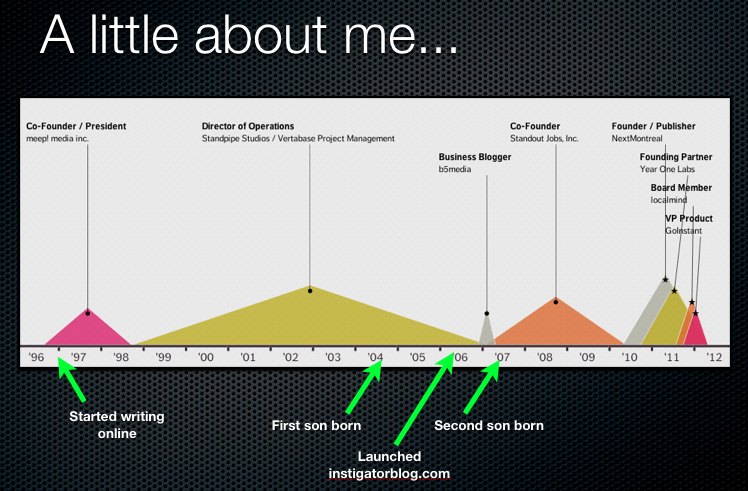Often when giving presentations I have an introductory slide about myself that shows a timeline of my experience. Here’s an example:

(Some presenters don’t need this sort of thing, I’m not quite that famous!)
What’s most interesting to me about this slide is right at the very beginning in 1996. It says, “started writing online.” And that’s true. I did start writing online 15+ years ago, when I created an e-zine for my first company. And then I launched my personal blog 6+ years ago. And here’s the thing: every single thing I’ve done professionally since 1996 is a direct result of blogging. Every opportunity, every project, every job, every startup. All because of blogging.
And today, I’m finally able to announce another such opportunity that came to me thanks to blogging, as well as my Year One Labs partner and friend, Alistair Croll.
Together, we’re writing a book on Lean Analytics that will be published by O’Reilly (as part of their Lean Series) in early 2013.
This is an incredible opportunity and I’m super excited to get started. Actually, we’ve already written a good chunk and we’ll be sharing much more over at www.leananalyticsbook.com. You can sign-up for updates, follow us on Twitter and get involved helping us with this project.
So what is Lean Analytics?
For me it’s the way you measure progress through the Lean Startup process. It’s a methodology and philosophy to keeping score and staying honest. We’re going to share a lot of practical content, but we’re not going to make it overly prescriptive or formulaic because we know all startups are different. We also want to draw in data, examples and information from non-tech startups to paint a broader picture of how people can and do use analytics in a multitude of businesses.
Having worked with a bunch of startups around analytics we’re well aware of some of the toughest questions you face. For example: how do you benchmark your numbers against others to know if things are going well or not? Early on, you don’t have your own baselines. We want to provide answers for that.
Or how about starting even more basic: what should you track? We’ll tackle that too, with plenty of case studies and examples to show you what other startups and companies are doing.
Writing Lean Analytics is going to be an interesting challenge. It’s been fun so far, and now that we can involve a community much more in the process it should be even more fun and interesting.
Please visit www.leananalyticsbook.com and sign-up.
We’ll start engaging very soon; we’re eager to find out what you’d like to know and learn so we can incorporate as much information into the book as possible directly from your feedback.
 Founding Partner at
Founding Partner at 